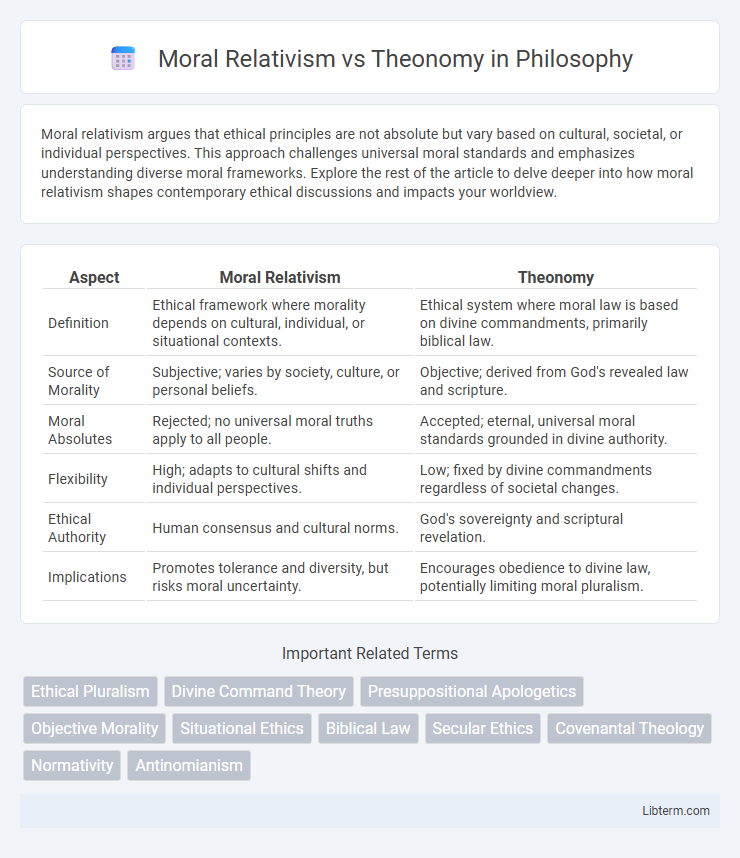Moral relativism argues that ethical principles are not absolute but vary based on cultural, societal, or individual perspectives. This approach challenges universal moral standards and emphasizes understanding diverse moral frameworks. Explore the rest of the article to delve deeper into how moral relativism shapes contemporary ethical discussions and impacts your worldview.
Table of Comparison
| Aspect | Moral Relativism | Theonomy |
|---|---|---|
| Definition | Ethical framework where morality depends on cultural, individual, or situational contexts. | Ethical system where moral law is based on divine commandments, primarily biblical law. |
| Source of Morality | Subjective; varies by society, culture, or personal beliefs. | Objective; derived from God's revealed law and scripture. |
| Moral Absolutes | Rejected; no universal moral truths apply to all people. | Accepted; eternal, universal moral standards grounded in divine authority. |
| Flexibility | High; adapts to cultural shifts and individual perspectives. | Low; fixed by divine commandments regardless of societal changes. |
| Ethical Authority | Human consensus and cultural norms. | God's sovereignty and scriptural revelation. |
| Implications | Promotes tolerance and diversity, but risks moral uncertainty. | Encourages obedience to divine law, potentially limiting moral pluralism. |
Understanding Moral Relativism: Core Principles
Moral relativism asserts that ethical standards vary across cultures and individuals, rejecting absolute moral truths in favor of context-dependent values. It emphasizes tolerance and the belief that what is deemed morally right or wrong depends on societal norms, historical circumstances, and personal perspectives. This framework contrasts sharply with theonomy, which advocates for divine law as the ultimate and unchanging moral authority.
Theonomy Defined: Foundations in Divine Law
Theonomy is defined as a theological framework that asserts divine law as the ultimate foundation for civil and moral governance, rooted in the belief that God's commandments, as revealed in scripture, should directly shape legal and ethical standards. This perspective contrasts with moral relativism, which holds that moral principles vary by culture or individual preference, lacking absolute authority. Theonomic principles emphasize the unchanging nature of God's law as the consistent metric for justice and social order.
Historical Context of Moral Relativism
Moral relativism emerged prominently in the 20th century as a philosophical response to the rigid ethical absolutism rooted in Enlightenment and modernist traditions. Its historical context is marked by increasing cultural pluralism and skepticism toward universal moral laws, influenced by anthropological findings and postmodern critiques of meta-narratives. The contrast with theonomy lies in moral relativism's rejection of divinely ordained ethical standards, advocating instead for context-dependent and culturally situated moral judgments.
The Societal Impact of Theonomic Ethics
Theonomic ethics, rooted in divine law as outlined in biblical scripture, profoundly influences societal norms by promoting a unified moral framework that transcends individual or cultural preferences. This approach fosters social cohesion and stability through clear, objective standards of right and wrong, contrasting sharply with the fluidity of moral relativism which can lead to fragmented value systems and social discord. The implementation of theonomic principles in legal and educational systems often results in communities emphasizing accountability, justice, and communal responsibility based on absolute ethical mandates.
Key Philosophers and Theologians: Perspectives Compared
Moral relativism, championed by philosophers like Friedrich Nietzsche and Richard Rorty, argues that moral principles are culturally dependent and subjective, rejecting universal ethical standards. In contrast, theonomy, supported by theologians such as R.J. Rushdoony and Greg Bahnsen, asserts that divine law, particularly biblical commandments, provides absolute, objective moral guidelines for society. These contrasting perspectives reflect a fundamental debate on whether morality is grounded in human context or divine authority.
Critiques of Moral Relativism: Common Arguments
Moral relativism faces significant critiques for undermining objective ethical standards by asserting that moral truths vary between cultures or individuals, leading to ethical inconsistency and moral confusion. Critics argue that this perspective fails to provide a solid foundation for universal human rights and justice, as it allows conflicting moral codes to coexist without resolution. Theonomy, in contrast, upholds divine law as the ultimate moral authority, insisting on absolute ethical standards derived from religious principles to address the perceived shortcomings of moral relativism.
Theonomy in Modern Society: Challenges and Applications
Theonomy in modern society faces challenges such as balancing religious law with secular governance and addressing diverse ethical perspectives in pluralistic cultures. Its application often involves integrating biblical principles into legal frameworks while respecting individual rights and modern democratic values. Despite tensions, theonomy advocates argue for moral absolutes as a foundation for social justice and legal accountability.
Moral Absolutism vs. Relativism vs. Theonomy
Moral Absolutism asserts unchanging ethical principles applicable across all cultures and times, grounded in objective standards. Moral Relativism argues that moral judgments are culturally dependent and subjective, varying with social, historical, or personal contexts. Theonomy integrates divine law as the ultimate authority, advocating that God's commandments are the absolute moral framework guiding human conduct and societal laws.
Case Studies: Moral Dilemmas in Both Systems
Moral relativism presents case studies where ethical decisions vary based on cultural norms, illustrating dilemmas such as differing attitudes toward euthanasia and freedom of speech. Theonomy, grounded in divine law, addresses moral dilemmas by adhering strictly to scriptural commandments, as seen in debates over capital punishment and sexual ethics. Comparative analysis reveals how moral relativism permits flexible interpretations, whereas theonomy demands absolute adherence to predetermined religious doctrines.
Bridging the Divide: Towards an Ethical Synthesis
Moral relativism emphasizes the variability of ethical judgments based on cultural and individual perspectives, while theonomy advocates for divine law as the ultimate moral authority. Bridging the divide involves integrating the flexibility of moral relativism with the steadfast guidance of theonomy to create a dynamic yet principled ethical framework. This synthesis fosters mutual respect across diverse moral landscapes while maintaining a coherent foundation rooted in transcendent moral truths.
Moral Relativism Infographic

 libterm.com
libterm.com